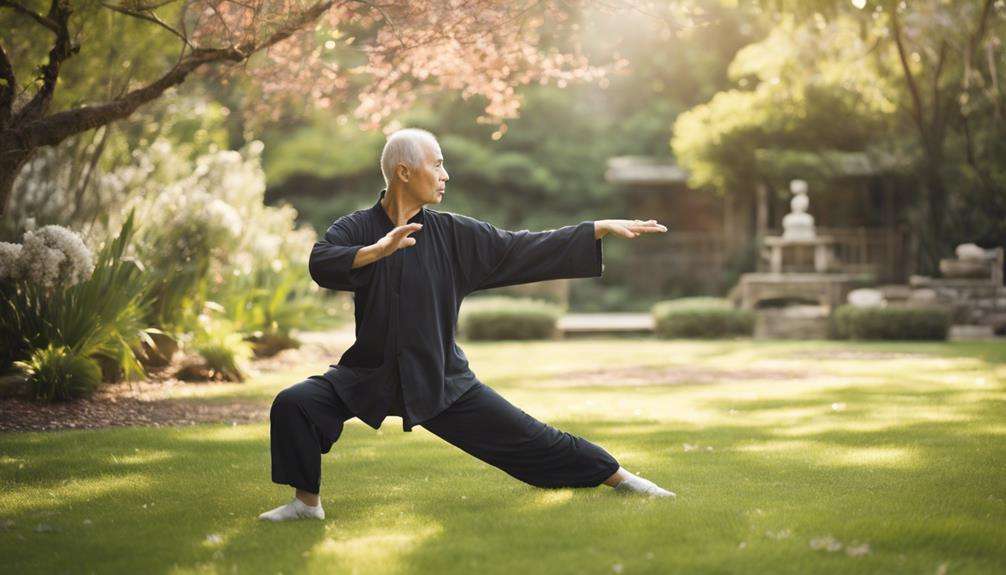When it comes to managing your blood pressure, the old saying 'mind over matter' truly holds weight. Exploring mind-body practices can offer you a path towards better blood pressure control.
From yoga's gentle movements to the calming effects of meditation, various techniques are available to support your journey towards lower blood pressure levels. Let's uncover the potential benefits these practices hold for your well-being and hypertension management.
Key Takeaways
- Yoga, meditation, deep breathing, and mindfulness practices effectively lower blood pressure.
- These mind-body techniques enhance stress management and support cardiovascular health.
- Regular practice shows sustained reductions in systolic and diastolic blood pressure levels.
- Incorporating Tai Chi and relaxation techniques complements lifestyle modifications for better blood pressure outcomes.
Benefits of Yoga for Blood Pressure
Yoga offers a thorough approach to lowering blood pressure by integrating physical postures, controlled breathing techniques, and meditation to promote relaxation and reduce stress levels. Regular practice of yoga has been shown to have significant benefits in reducing both systolic and diastolic blood pressure readings. The holistic approach of yoga in managing blood pressure not only addresses the physical aspects but also the mental and emotional components, making it a complete method for enhancing cardiovascular health and overall well-being.
The important effects induced by yoga play a vital role in reducing stress levels, which, in turn, positively impact blood pressure regulation. By incorporating yoga into your daily routine, you can experience improvements in blood pressure management that complement traditional treatments. This integration of yoga can lead to enhanced quality of life by providing a natural and effective means to support cardiovascular health. Embracing yoga as part of your routine can be a transformative step towards achieving better blood pressure control and overall well-being.
Role of Meditation in Hypertension
When considering strategies for managing hypertension, meditation emerges as a compelling practice backed by research demonstrating significant reductions in both systolic and diastolic blood pressure levels. Studies have indicated that techniques like transcendental meditation can lead to notable decreases in blood pressure. Transcendental meditation promotes deep rest and relaxation, aiding in lowering stress hormones such as cortisol that contribute to hypertension.
By incorporating regular meditation into your routine, you can enhance stress management, promote better mental well-being, and improve overall cardiovascular health. Clinical trials have shown that meditation, when used in conjunction with other lifestyle modifications, can effectively reduce high blood pressure. This practice triggers the relaxation response, fostering a sense of calm and balance that's beneficial for heart health.
Introducing meditation as part of a holistic approach to blood pressure management may provide long-term benefits and complement traditional treatments effectively.
Deep Breathing Techniques for BP

Utilizing specific deep breathing techniques has been shown to effectively lower blood pressure levels by inducing relaxation and reducing stress, according to scientific research. Deep breathing, particularly diaphragmatic breathing, plays a significant role in promoting relaxation responses that can help manage stress and contribute to better blood pressure control.
Studies indicate that practicing deep breathing exercises can lead to temporary reductions in blood pressure, highlighting its potential as a complementary approach to traditional treatments for blood pressure management. By incorporating deep breathing into a holistic health strategy, individuals may experience improvements in overall well-being and cardiovascular health.
This practice offers a natural and accessible method for enhancing stress management and supporting blood pressure regulation. Embracing deep breathing techniques as part of your routine can't only benefit your blood pressure but also contribute to a more balanced and healthier lifestyle.
Mindfulness Practices for Lowering BP
Mindfulness practices, such as Mindfulness-Based Stress Reduction (MBSR), have demonstrated significant reductions in both systolic and diastolic blood pressure readings in clinical settings.
Research indicates that mindfulness meditation can lead to sustained decreases in blood pressure levels over an extended period.
Breathing Techniques for BP
Implementing deep breathing techniques, such as diaphragmatic breathing, can effectively lower blood pressure levels by inducing relaxation and reducing stress. Deep breathing has been shown to temporarily reduce blood pressure, contributing to better stress management and overall cardiovascular health.
Consistent practice of mindful breathing can complement traditional treatments for hypertension, offering a holistic approach to blood pressure management. By incorporating deep breathing into your daily routine, you can take a proactive step towards regulating your blood pressure without medication.
Mind-body practices focusing on breathing techniques provide a valuable non-pharmacologic method to help individuals improve their cardiovascular health. Take a few moments each day to focus on your breath and experience the benefits of this simple yet powerful technique.
Meditation Benefits for BP
To effectively lower blood pressure levels through meditation, consider the significant reductions in both systolic and diastolic blood pressure that studies have associated with mindfulness practices.
Mindfulness meditation techniques promote relaxation and stress reduction, which are essential for maintaining cardiovascular health and managing hypertension. By incorporating mindfulness-based stress reduction into your daily routine, you may experience improved blood pressure control over time.
Clinical studies have shown promising results in using mindfulness practices to lower blood pressure, highlighting the importance of integrating these techniques alongside traditional treatments for hypertension management. Embracing mindfulness not only enhances your overall well-being but also empowers you to take proactive steps towards better cardiovascular health through the power of meditation.
Tai Chi and Blood Pressure Control

Regular practice of Tai Chi has been shown to substantially contribute to improvements in blood pressure control. This ancient Chinese practice involves gentle physical movements, controlled breathing, and meditation, all of which work together to promote relaxation and reduce stress.
Research indicates that regular Tai Chi practice can lead to reductions in both systolic and diastolic blood pressure levels. The slow and flowing nature of Tai Chi movements helps enhance circulation, improve muscle strength, and boost overall wellbeing. By combining these physical movements with mental focus, Tai Chi supports cardiovascular health, which is beneficial for managing high blood pressure.
Studies have highlighted the positive impact of Tai Chi on blood pressure regulation, making it a valuable addition to lifestyle modifications for individuals looking to improve their blood pressure levels. Incorporating Tai Chi into your routine may offer a holistic approach to blood pressure management while also promoting overall health and wellbeing.
Relaxation Response for Hypertension
Practicing the relaxation response technique consistently can greatly aid in managing hypertension by inducing a state of calmness that leads to decreased heart and breathing rates, according to research findings. This mind-body intervention has shown promising results in helping individuals with hypertension.
Techniques such as mindfulness meditation and diaphragmatic breathing are integral components of the relaxation response. Studies have demonstrated that participants who engaged in the relaxation response experienced reductions in their blood pressure levels.
Additionally, research has indicated that gene expression changes associated with immune regulation and cardiovascular development occur in individuals who exhibit a drop in blood pressure through mind-body interventions. By incorporating the relaxation response into your routine, you may effectively manage hypertension and observe a decrease in heart rate, contributing to overall cardiovascular health.
Integrative Approaches to Lower BP

Integrative approaches such as yoga and meditation have demonstrated significant benefits in lowering blood pressure by promoting relaxation and reducing stress.
Research has shown that practices like mindfulness-based stress reduction (MBSR) and transcendental meditation (TM) can lead to notable decreases in both systolic and diastolic blood pressure readings.
Yoga for Hypertension
To effectively manage hypertension through integrative approaches, incorporating yoga into your routine can play a significant role in lowering blood pressure levels. Yoga is beneficial for blood pressure management as it reduces stress, promotes relaxation, and enhances cardiovascular health.
Specific yoga poses, breathing exercises, and meditation techniques can positively impact blood pressure. Research indicates that regular yoga practice leads to notable reductions in systolic and diastolic blood pressure.
By emphasizing mindfulness, breath control, and gentle movements, yoga aids in stress management and blood pressure control. Including yoga in a holistic approach to high blood pressure management may provide additional advantages beyond conventional treatments.
Embracing yoga as part of your routine can contribute to better blood pressure outcomes.
Meditation Benefits BP
Meditation, particularly transcendental meditation, has shown in studies to yield substantial reductions in both systolic and diastolic blood pressure levels. This practice promotes deep rest, effectively lowering stress hormones like cortisol, contributing to improved stress management.
When deep breathing techniques are integrated with meditation, they enhance relaxation, leading to temporary decreases in blood pressure. Consistent meditation practice can complement traditional therapies for blood pressure management, offering a holistic approach to health.
Frequently Asked Questions
What Are the Mind Body Exercises to Lower Blood Pressure?
To lower blood pressure, practice various mind-body exercises like yoga poses, deep breathing, and mindfulness techniques. Incorporate stress reduction methods, such as Tai Chi and progressive relaxation. These practices promote overall well-being and cardiovascular health.
How Can I Lower My Blood Pressure With My Mind?
Focus on deep breathing techniques, mindfulness, yoga poses, and visualization exercises. Engage in biofeedback therapy, progressive relaxation, guided imagery, tai chi, and hypnosis sessions. These practices aid in stress management and promote lower blood pressure levels.
What Type of Meditation Lowers Blood Pressure?
Deep breathing, guided imagery, progressive muscle relaxation, body scan, loving-kindness meditation, yoga therapy, qigong, tai chi, mindfulness meditation, and visualization techniques all contribute to lowering blood pressure by promoting relaxation and reducing stress levels.
What Are Relaxation Techniques to Lower Blood Pressure?
To lower blood pressure, practice deep breathing, progressive muscle relaxation, guided imagery, yoga poses, and Tai Chi. Utilize biofeedback therapy, hypnotherapy techniques, mindful walking, Qigong practice, and aromatherapy benefits. These methods promote calmness and reduce stress levels effectively.
Conclusion
To summarize, incorporating mind-body practices such as yoga, meditation, deep breathing, mindfulness, Tai Chi, and the relaxation response can be like planting seeds for a healthier life. Just as a seed needs nurturing to grow into a strong and resilient plant, these practices require consistent care and attention to help lower blood pressure and improve overall well-being.
Embrace these practices as your garden of health, and watch as your blood pressure blooms into a state of balance and harmony.






